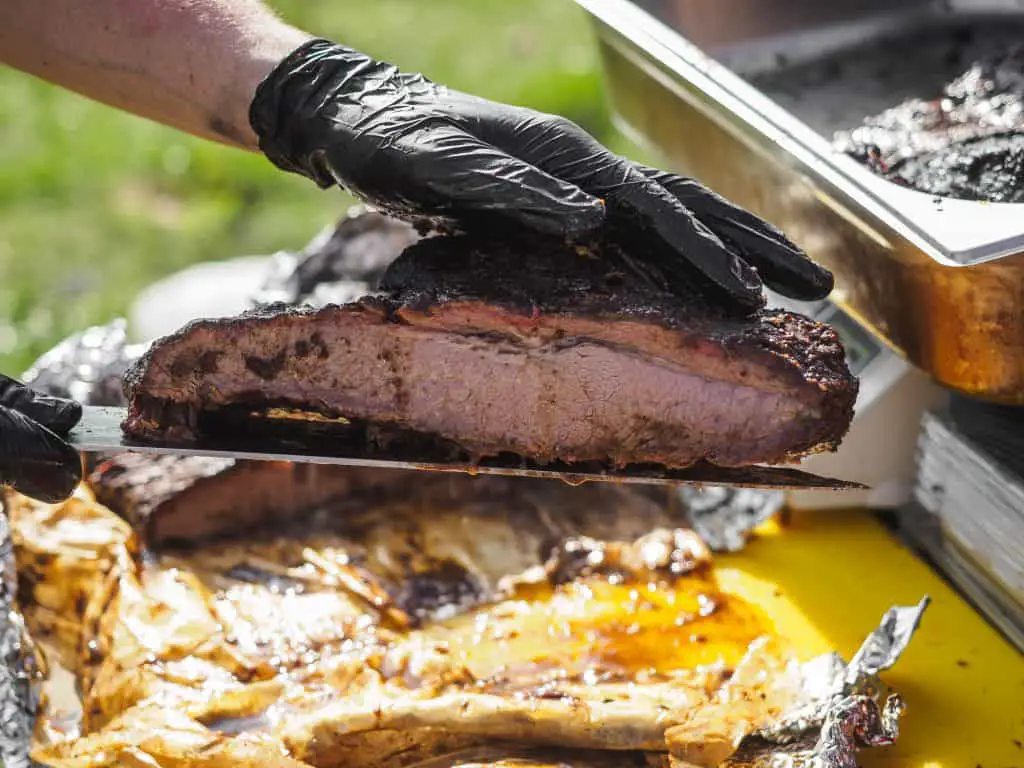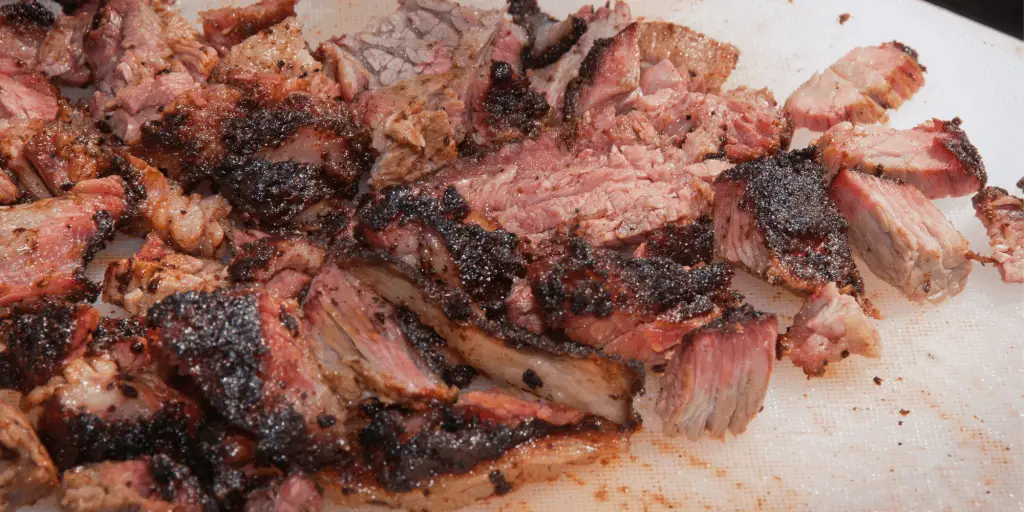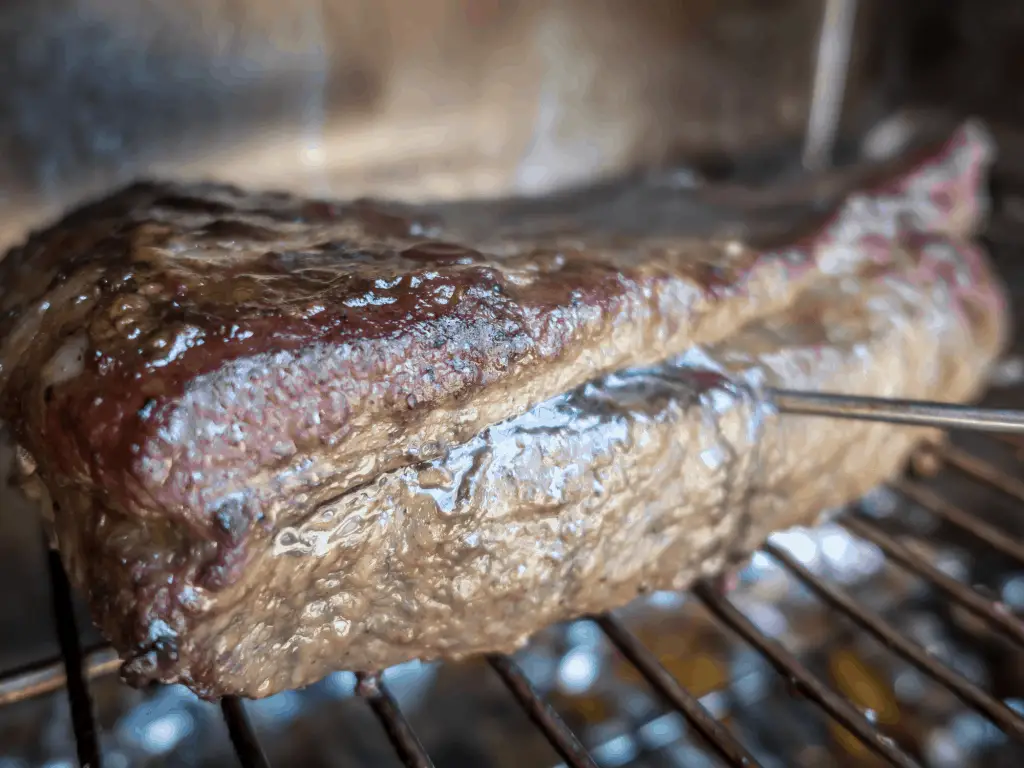One of the greatest feasts is a perfectly tender and juicy brisket. But, just as a brisket can be tough, it can also be too soft, and practically fall apart before you can serve it up on a plate!
If your brisket did fall apart or almost crumble as you tried to cut it, then it’s very likely you’ve overcooked it. Let’s look at what could cause your brisket to fall apart, crumble, or become overcooked, and what you can do to fix it and prevent it for next time.
Why Did My Brisket Fall Apart?
The most common reason a brisket falls apart when you try to cut it is that it’s cooked too long at a low temperature and essentially is now overcooked.
As a brisket cooks at low temperatures the connective tissue that usually holds the muscle fibers together breaks down. When brisket is overcooked, the connective tissue completely turns to gelatin and loses its ability to hold the muscle fibers, causing the brisket to crumble and fall apart.
When brisket is cooked perfectly it’s incredibly tender and juicy but still holds its form. To test for the doneness of the brisket it’s always best to go by internal temperature, as well as go by tenderness. You should aim to bring the brisket up to 195-200°F before removing it from the heat, but it should also probe without resistance.
Can You Overcook A Brisket?

When you cook your brisket low and slow, with a fair bit of patience you’ll get a delicious hunk of meat that holds its shape and juices when you cut it into slices. Put simply, the fat melts and the collagen and other connective tissue in the meat turn to gelatin that makes the meat tender and juicy — without falling apart. However, cooking your brisket low and slow too long actually causes quite the unwanted result.
Although it can still be juicy, it will completely lose its ability to hold its shape, as all the collagen and connective tissue have been obliterated and there is nothing to hold the muscle fibers together.
Brisket needs this connective tissue and fat to hold the meat together. Although an overcooked brisket isn’t inedible, it’s not as glorious as perfectly beautiful slices of brisket.
So, a brisket that’s cooked too long at low temperatures will fall apart. But, if you cook brisket too long at higher temperatures or hot and fast cooking, then it will more likely dry up and become a tough brisket.
Will Overcooking Brisket Make It Tough?
The truth is you can actually overcook a brisket in more than one way. Overcooking your brisket at high temperatures will make it tough. But, cooking your brisket for too long at low temperatures will cause your brisket to become too soft, crumble, and fall apart.
If you’re worried your brisket isn’t going to cook in time for your event you may be tempted to turn up the heat. Although you CAN turn it up a bit, if you turn it up too much, past 275°F, you will more likely overcook your brisket and it will become tough.
On the other side of things, if your brisket is done too early before your event, if you keep it going at a low temperature for too long it will also become overcooked but will be falling apart rather than being too tough.
So, if your brisket is already done well before you’re ready to eat it’s actually better to take it off the heat and simply rest it longer. You can rest brisket for up to 8 hours in a faux cambro at ideal conditions, or in a hot box or oven at a low temperature.
How To Tell If Your Brisket is Overcooked
If you’ve cooked your brisket at low temperatures for too long, you’ll know it’s overcooked if it crumbles when you try to slice it. The meat will fall apart in shreds, making it nearly impossible to serve as traditional slices. You’ll also notice that the meat is too soft–a good brisket is tender but still holds its shape when you cut it.
If you’ve cooked your brisket at temperatures too hot, then the brisket will be tough, dry, and chewy. Although you can douse it in barbecue sauce, or try to salvage it by cooking it further in beef broth or stock, it’ll still be less appetizing for your guests. Unfortunately, In both cases of brisket being overcooked, it’s not entirely easy to have a quick fix.
Brisket Is Too Soft
If your brisket is too soft, it’s likely it’s been cooked for too long at low temperatures, or has been cooked in too much liquid. You’ll know as when you touch it with your hands you will leave noticeable dents in it.
The bark will also likely not be set correctly, and be very easily sloughing off at the slightest touch. Make sure to trim the fat off the brisket before you being cooking it. If your beef brisket is too soft, but it’s not completely falling apart, then you can try serving it by slicing it a bit thicker than traditionally done, about one inch thick.
Brisket can be too soft whether it’s been cooked as a smoked brisket, braised brisket in the instant pot or slow cooker, even a sous vide brisket.
Brisket Is Crumbling

If your brisket is crumbling completely at the slightest touch, then it’s been far overcooked, much too long at low temperatures. All the fat and connective tissue is likely to have completely melted away, and won’t hold its form at all. If it is crumbling, it may still have a decent flavor, so you can salvage it by making brisket burgers, sandwiches, tacos, or by using it as ground beef in pies or chili.
If just the edges of the meat are crumbly, try cutting into the center of the meat. It’s possible that you could have overcooked the exterior of the meat but left the interior intact. The rest of the brisket might be salvageable if the inner meat is still soft and juicy!
Why Does My Brisket Fall Apart When I Cut It?
Your brisket falls apart when you cut it as it’s simply been overcooked at low temperatures. This is usually by either letting the brisket’s internal temperature get too high, 210°F or more or by cooking it for too long between 180-200°F.
This can happen if you overestimate how long it’ll take to cook the meat or if you aren’t monitoring the internal temperature of the brisket throughout the various stages of the cook. When a brisket is overcooked too long at low temperatures, all the connective tissue completely disintegrates. Usually, the connective tissue holds the muscle fiber strands together, so in the absence of any connective tissue, there is nothing holding the meat together.
When you cut the brisket it applies pressure to the muscle fibers. In the absence of any connective tissue, in an overcooked brisket, the soft meat simply gives way and falls apart. Although the famous saying in barbecue is to cook to tenderness, not time or temperature, using a trusty thermometer of an accurate probe does help gauge the doneness of the brisket.
To be safe, always aim to test the brisket once it’s up to 195-200°F, as this is a good indication that the brisket is done, without being overdone.
Can You Fix An Overcooked Brisket?
Once the brisket is overcooked, you can’t go back and cook it less, BUT you can make a few changes to how you serve it or slice it to salvage it.
Firstly, always make sure you slice against the grain. Be aware that if you’ve cooked a whole packer brisket that both the point and the flat have their muscle fibers running different ways. Instead of cutting the brisket sliced thin, to help it maintain its shape and not fall apart, cut them at about one inch thick.
Secondly, if your smoked brisket is simply too tender and falling apart at the touch, it could be preferable to serve it in burgers, sandwiches, or tacos. The bread, dressing, BBQ sauce, lettuce, vegetables, and any other toppings you use will disguise the texture of the brisket. Plus, everyone likes their brisket soft when it’s in a burger! This also makes for a great option when serving brisket for a large crowd.
Your other option, which I’ve done on numerous occasions, is to actually serve it up like ground beef. My favorite adaptation is making brisket nachos or chili. But, your options are not limited here — you could serve it as curried mince, put it in savory pies, or even lasagna.
How To Prevent Overcooked Brisket

The best way to fix an overcooked brisket is actually just to prevent it from happening next time. Learn from your mistakes, that’s the key to barbecue!
To avoid the two ways you can overcook brisket you just need to pay attention to both the time and internal temperature. The final test of doneness is to check that it’s reached your desired tenderness.
To keep your brisket from overcooking and falling apart, make sure you pull it before it reaches 205°F, knowing that it may continue to rise in temperature as it rests.
To keep your brisket from overcooking and becoming tough, simply don’t cook it at temperatures higher than 250°F, or 225°F for small briskets. This allows the brisket plenty of time to transform from a chewy, tough hunk of meat, to a melt in your mouth juicy morsel of a feast.
To extend the time of the cook you can also use a water pan, or spritz your brisket. Both add humidity and give you more time to develop the bark and smoke ring on your brisket.
In either case, always use a trusty thermometer or probe. Temperature isn’t the tell-all sign but it sure helps keep a track of how your brisket is progressing! Once it looks like the brisket is approaching the 195-200°F mark it’s time to get out a toothpick or your probe to make sure the tenderness is to your liking!

